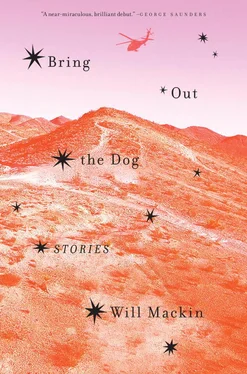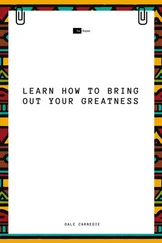Will Mackin - Bring Out the Dog
Здесь есть возможность читать онлайн «Will Mackin - Bring Out the Dog» весь текст электронной книги совершенно бесплатно (целиком полную версию без сокращений). В некоторых случаях можно слушать аудио, скачать через торрент в формате fb2 и присутствует краткое содержание. Город: New York, Год выпуска: 2018, ISBN: 2018, Издательство: Random House Publishing Group, Жанр: prose_military, на английском языке. Описание произведения, (предисловие) а так же отзывы посетителей доступны на портале библиотеки ЛибКат.
- Название:Bring Out the Dog
- Автор:
- Издательство:Random House Publishing Group
- Жанр:
- Год:2018
- Город:New York
- ISBN:978-0-812-99564-0
- Рейтинг книги:5 / 5. Голосов: 1
-
Избранное:Добавить в избранное
- Отзывы:
-
Ваша оценка:
- 100
- 1
- 2
- 3
- 4
- 5
Bring Out the Dog: краткое содержание, описание и аннотация
Предлагаем к чтению аннотацию, описание, краткое содержание или предисловие (зависит от того, что написал сам автор книги «Bring Out the Dog»). Если вы не нашли необходимую информацию о книге — напишите в комментариях, мы постараемся отыскать её.
Bring Out the Dog — читать онлайн бесплатно полную книгу (весь текст) целиком
Ниже представлен текст книги, разбитый по страницам. Система сохранения места последней прочитанной страницы, позволяет с удобством читать онлайн бесплатно книгу «Bring Out the Dog», без необходимости каждый раз заново искать на чём Вы остановились. Поставьте закладку, и сможете в любой момент перейти на страницу, на которой закончили чтение.
Интервал:
Закладка:
Cheyenne’s eyes shone silver in the black light. Her lips were shiny and full.
“I don’t think so!” she shouted back.
REED CARRIED THE GPS in hand, and the laser designator in a backpack over his shoulder. I carried the laser spot tracker and the radio. The sun shone in our faces. We crossed sandy knolls dotted with scrub brush, following the GPS to the OP’s coordinates.
“This is it,” Reed said. He dropped his pack onto a sandy knoll among a thousand sandy knolls.
Trash left behind by previous controllers—spent D-cells, empty Rip It cans, rusty 40mm brass—surrounded the OP. We looked down on the salt basin, where, a half mile northeast, there ran a diagonal line of bombed-out targets. Misses on either side of the target line had cratered and scorched the salt. Chocolate mountains stood beyond the targets, on the far rim of the basin. The flawless blue sky narrowed their shadows into points.
Reed set up the designator, and I set up the tracker. The tracker had a powerful zoom. Through it, I could see the targets clearly. Although the cannons were missing—along with the turrets, tracks, armor plates, and engines—the burnt frames were unmistakably tanks.
The designator had a scope, boresighted to the laser. Lying prone in the sand, ball cap backward, Reed aimed through the scope. He put the crosshairs on the target, then pulled the trigger. The laser clicked loudly. It operated outside the visible spectrum; therefore, it was hidden to the naked eye. Looking through the tracker, though, I could see it.
First, Reed aimed for a half-buried sprocket at the end of a cracked axle under the northernmost tank, but a rise in the middle distance caused the laser to skip. Next, he tried to paint a stanchion that connected the main chassis to the turret ring on the center tank, but the energy reflected straight down. After several more attempts to achieve a good refraction, he shut off the laser.
“These targets are shit,” he said.
Twenty minutes remained until the B-52 was scheduled to drop. I powered down the tracker. “I’ll go,” I said.
Grabbing the radio, Reed said, “I’ll come with.”
THE MUSIC CONTAINED noises of a failing pump—the screech of cavitation, the whack of a thrown bearing, the rattle of a loose intake grate. A woman rolled on the stage, banging her heels against the plywood surface. Women waiting their turns to perform did so behind a curtain, in what must’ve once been the control room. The bartender chewed her nails behind the cash register. Over in the corner, on a sofa they had all to themselves, Cheyenne and Reed wiggled under the cover of her thick black cape.
A tattooed runt in a Raiders jersey entered. Ignoring the girl onstage, he stared at Reed and Cheyenne, whose head was thrown back, whose long brown hair hung loose upon her cape. Reed’s boots stuck out from under the hem. The runt stood in the center of the room. He turned to the bartender, and she stopped chewing her nails. The runt pointed at the sofa.
“Does Bas know about this?” he asked.
REED CARRIED THE radio. I carried the tarp, the cord, and my knife. The radio was tuned to the frequency on which the B-52 would contact us. Static poured out of its speaker like sugar.
The salt basin was not what I’d expected. It was not the flat, milky surface it appeared to be from a distance. Rather, it reflected the sky. And it was made up of a billion salt teardrops stood on their pointy ends. These teardrops disintegrated into crystals under my boots.
A salt bridge between two craters led to the tank on which Reed and I would hang the tarp. We climbed inside its ashen frame.
Once upon a time, there’d been no such thing as a tank. Men had fought to a standstill using rifles, mortars, and artillery. Then someone had an idea to break through the lines: a heavily armored vehicle mounted with a cannon. So the first tank came to be, and it did its job well, until it was outgunned and outmaneuvered by a better tank. Then a new idea was hatched, and a new and improved tank came along. Eventually, that new and improved tank also became outgunned and outmaneuvered, requiring an even better tank, and so on. Some of the obsolete tanks wound up being sold to foreign nations—Egypt, Kuwait, Peru. Others decorated the lawns outside VFWs. Still others were sent here, to Baker’s Strong, where they were crushed, burned, twisted, and melted back into ideas.
I unfolded the tarp, silver on one side and brown on the other, with eyeholes in the corners. I measured a length of cord. I pulled out the ivory-handled hunting knife that I’d taken off a dead Taliban one night on our last deployment, and I cut the cord. I tied a corner of the tarp, silver side facing the OP, to what remained of the turret ring.
“Can I see that?” Reed asked, holding his own length of cord.
Reed had taken an AK off a different dead man that same night. I folded my knife and passed it to him.
THE BARTENDER SHRUGGED in response to the runt’s question regarding whether or not Bas knew about what was happening on the sofa. The runt then turned and left the Pump House in a hurry. I shouted to Reed from my barstool. He popped his head out from under Cheyenne’s cape.
“What?” he yelled over the music.
“Time to go!” I yelled back.
Noise smeared the space between us.
“What for?” Reed said.
“Her boyfriend’s coming!” I said.
“What boyfriend?” Cheyenne hollered.
Cheyenne swore that she and Bas weren’t a thing, and never had been. He was just a fat, dumb asshole from whom none of us had anything to fear. Still, she decided to leave work early. The bartender gave her a baseball bat from behind the register. Cheyenne handed the bat over to Reed. Reed insisted that we walk Cheyenne home.
We waited outside, by a power station, while Cheyenne changed out of her cape. High-tension wires bent down to connect with voltage converters. The buzzing converters tossed a carcinogenic heat.
“What happens when Bas shows up?” I asked Reed.
“We tune him up,” he said.
“What about the five dudes he brings with?”
“There’s no five dudes.”
Reed tossed the bat into the air and caught it by the business end. He passed the bat to me, handle first. Although it was the most nonconductive thing imaginable—a wooden bat with electrical tape wrapped around the handle—it acted like an antenna. Thus, I received an image of Bas, sitting alone at his beat-up desk, in his shithole office, behind East Wendover’s only muffler shop. I suppose he could’ve been the mayor of that side of town, which would’ve explained his overall weariness, as men like the runt were always running through the night to bring him bad news.
The door to the Pump House opened, and music blasted out. Cheyenne had tied her hair back into a ponytail and changed into jeans. She smiled at Reed in a way I’d never been smiled at, which made me wonder what I was doing wrong.
FIRST THING I did, upon returning to the OP, was draw the attack geometry in the sand. I’d learned this trick from Reed, years ago. It was his habit back then; now it was mine, as I’d found it harder and harder to keep things straight. With all the back-and-forth, that is, between the war and home, and training for the war, sometimes I couldn’t pinpoint the year, or the season. Sometimes I even forgot where I was, and I had to stop and think. For example: western Utah, 2009.
I made a point in the sand to represent the OP. I made a point for Wendover, where the B-52 would begin its target run, and a point for the target, both at relative distances and bearings from the OP. I drew a vector in the direction the B-52 would fly—east-southeast—from Wendover to the target. I drew an arrow from the OP to the target, in the direction the laser would shine. My finger in the warm sand felt like summer, when, in fact, it was fall.
Читать дальшеИнтервал:
Закладка:
Похожие книги на «Bring Out the Dog»
Представляем Вашему вниманию похожие книги на «Bring Out the Dog» списком для выбора. Мы отобрали схожую по названию и смыслу литературу в надежде предоставить читателям больше вариантов отыскать новые, интересные, ещё непрочитанные произведения.
Обсуждение, отзывы о книге «Bring Out the Dog» и просто собственные мнения читателей. Оставьте ваши комментарии, напишите, что Вы думаете о произведении, его смысле или главных героях. Укажите что конкретно понравилось, а что нет, и почему Вы так считаете.












